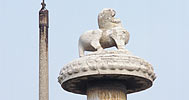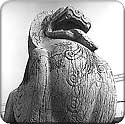Region: 安徽Anhui
-
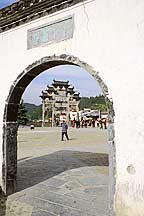
One of main entrances into the complex of Ming and Qing houses and buildings.
-
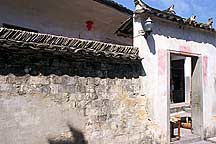
Someone was preparing food for cooking.
-
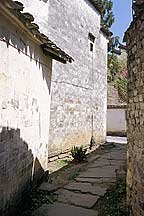
Short alley.
-
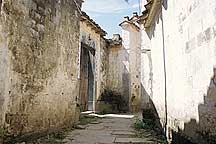
Back alley.
-
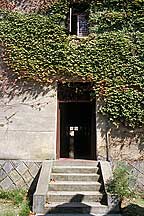
-
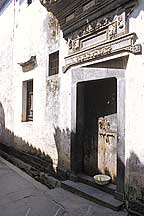
A bowl of corn by a doorway.
-
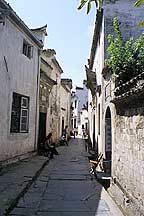
Lots of folks sat by their doorway steps to relax in the shade.
-
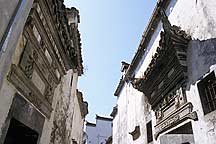
A pair of 门罩 menzhaos(literally, a door shade or cover). A distinctive architectural element of this region. These solid carved brick designs are usually found above doorways or in areas where strong sunlight hits. The reason behind this ornate invention is 风水 feng shui. Legend has it that the merchant class descended from the 商 Shang Dynasty(about 3,000 years ago) Shang was the second of three dynasties before the unification of the empire by the first emperor of china. After about 400-500 years of civilization, the cultured Shang was defeated by the rowdy 周 Zhou in about 1025 BCE. Shang people were forced southward in a massive exodus. They settled in Anhui and began to engage in the lowly activity of doing business to survive. A merchant class culture was created and systematized. And the word Shang(which also means merchant in chinese) was used to define this merchant activity. The Shang merchants were very successful And with money piling up, they began builing elaborate buildings and manors. To ensure that fortunes continure to come their way smoothly, feng shui was routinely consulted. The classic 易经 YiJing(I-Ching) states that Shang people(merchants) should not have their doors face south. This,however,goes against common feng shui practice which favors the southward direction that faces the sun. Unfortunately, within the five elements in chinese cosmology, Shang belongs to the metal group, and sun fire melts metal. No good. Today, the houses and buildings in Xidi do not face south. And to further protect themselves from the fire elements and bad influences,and at the same time to welcome fortune, they incorporated this menzhao into their design philosophy.
-
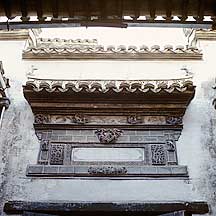
Menzhao inside the bouse.
-
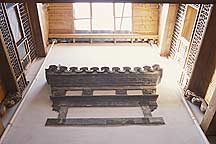
Another interior menzhao facing the intense sunlight.
-
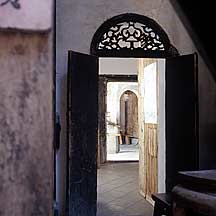
Interior of a eating and drinking area.
-
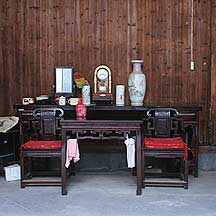
I had a small conversation with the owner of this house. A woman in her 60s with her grandson were sitting inside when I walked in. She had been doing some dusting and wiping as can be seen in the photo. Her single wood-paneled room was sparse with nothing more than what you can see in the photo. Above was a open ceiling with a menzhao(see the previous square photo) attached to the white stone wall. Overall, it was no ordinary house. But there were no tourists around. I was not surprise since I noticed that not a single tour guide look in its direction. So, it became my target instead. I asked the matron why is her house not as popular as the others. It seems obvious--she had nothing to sell nor did she collects an entrance fee(she did collect one from me), so there is no commission to be made here. Also of interest is that the villagers are given a small(very small)percentage of the tourist money earned annually.
-
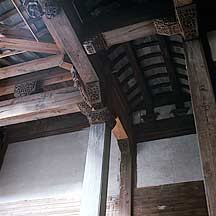
The post and beam timber construction with finely carved brackets.
-
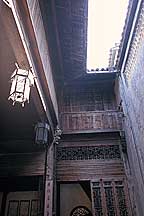
Xidi is well-known for three masteries: stone carving,brick carving, and wood carving. The following phots show a little of what they can do.
-
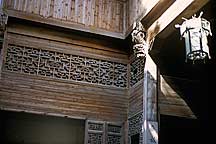
More wood carvings. Because of the wealth of the merchants, quality materials and workmanship ensure their survival.
-
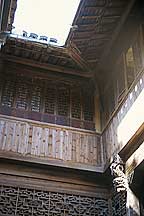
More wood carvings.
-
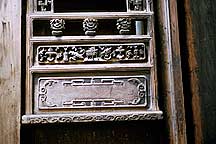
Details of carving on a door panel.
